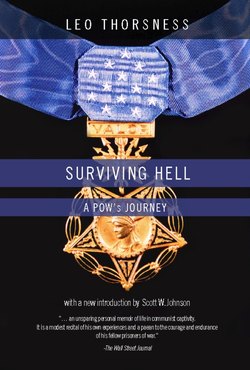Читать книгу Surviving Hell - Leo Thorsness - Страница 10
На сайте Литреса книга снята с продажи.
ОглавлениеCHAPTER 3
WHAT I BROUGHT WITH ME
As I lay there I wondered whether, if the North Vietnamese allowed me to live, I could survive—not just physically, but mentally and morally. Would I break? And if I did, would the failure stay with me forever? These were some of the questions that swarmed into my head in that hut in the mountains of North Vietnam. Most of all I wondered if my 35 years of freedom had prepared me for what lay ahead.
Born into the Depression in 1932, I was a Minnesota farm kid from what always seemed to me a typical family. Mother and father, older sister and brother. My parents didn’t get past the eighth grade; their education came from working the land on a farm near the town of Walnut Grove where they settled after getting married.
My dad was not much of a talker, but he was a good worker and I learned from that. He believed in the American Dream and was ambitious. Even as a young farmer with his own fields to till, he hired himself out to work for others, digging potatoes and picking corn by hand. When my brother John and I were old enough, dad bought a hay baler and converted a 1932 Chevy coupe into a tractor to pull it. We baled alfalfa for other farmers; it was hard and itchy work.
Later on I would discover that we had been poor—working hard to scratch out an existence. But we never went hungry, and we never had to sell our land. If we were poor economically, we were rich in love and responsibility. Like most of our neighbors we felt lucky to be who we were and had no doubts about America, for the present or the future.
Farmers raise food. So we fed ourselves. It wasn’t always sweet corn necessarily, but new field corn tastes almost as good. Our oats went into our cattle, hogs, and chickens. We sold our barley and wheat and made our own flour. Cattle supplied a lot of our needs. A horse-drawn manure spreader fertilized the fields. Using a handoperated milk separator, we were able to sell the cream and to make cottage cheese. The family drank the skim milk, and the rest put weight on the hogs. When the cows passed calving age, we had them for dinner. Chickens gave eggs to eat and to sell for grocery money; when the hens and roosters passed their prime, they, too, went into the pot. We hand-pumped water from the well and had a cistern in the basement. In summer, a nearby lake offered an easy way to clean off the day’s grime from shucking grain and slopping the hogs. In the winter, coal and corn cobs heated the water in which we bathed and washed our clothes.
We defeated the Depression one day at a time. Spread-eagled on that rough bamboo floor, I told myself that I would have to fight captivity the same way.
Samuel Johnson once said that the prospect of death concentrates the mind wonderfully. This was certainly true in my case. Like most people, I had skated along the surface of life assuming that things would always be good and taking for granted the miraculous gifts I had been granted. There was no question in that hut about what truly mattered to me: family, faith, and friends. Family was constantly—almost obsessively—on my mind in those first hours: my parents, sister and brother, but most of all my wife and daughter. I realized sadly that they too were about to become prisoners, trapped by my captivity.
I was physically bound—bound into my pain, so to speak. My mind was my only escape. I built a memory room in those first hours of imprisonment. It wasn’t fancy. It was a lot like the tree house I built in our farm grove as a seventh grader. I used the old lumber piled behind our barn, adding a crude door and tin sheets from a torn-down hen house for the roof. I sawed a few boards and two-by-fours and nailed in a couple of crude shelves. It was a perfectly serviceable memory room.
I used the old egg crates we kept in the barn to store my memories. Three crates were labeled Family, Faith, and Fun. Soon I added another, for Friends. So much of my life involved airplanes that I added a fifth crate: Flying. Underlying every memory was the worry about what my wife and daughter were thinking. Had they heard yet? Are they busy constructing memory houses too?
The image of Gaylee shimmered in my mind. I met her after graduating from Walnut Grove High School in the fall of 1950. Knowing I would have to put myself through college, I had enrolled at neighboring South Dakota State in Brookings. Right away I learned that my high school strengths—sports, girls, and hunting—wouldn’t help me academically. After finishing a quarter at Brookings, I made a wise decision: Join the military, grow up, decide what I wanted to do in life, and perhaps use the GI bill later on to help pay for college after I got some real-life experience.
We Midwesterners thought of the military first when we were arranging our lives. My older cousin was killed in World War II, my future brothers-in-law all served in the war—one was killed in a B-17—and my brother was serving with distinction in Korea when I was serving without distinction in college. So in December 1950, I signed up for a four-year enlisted hitch in the U.S. Air Force.
